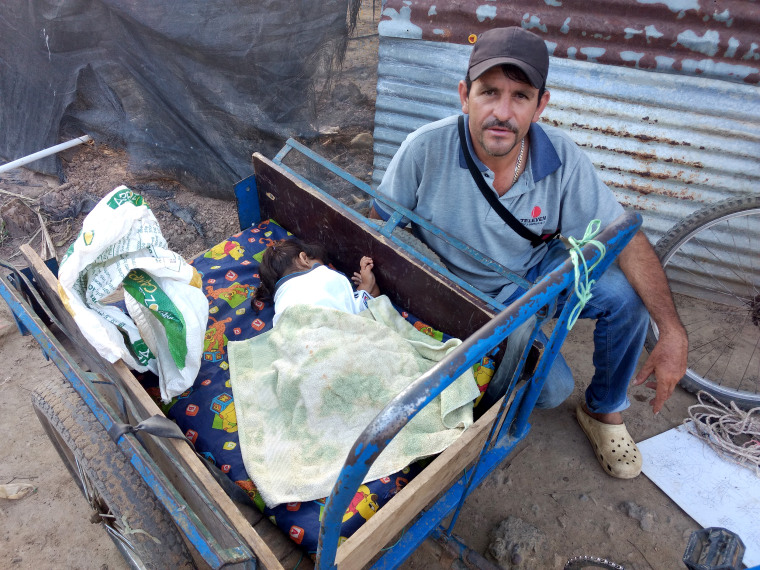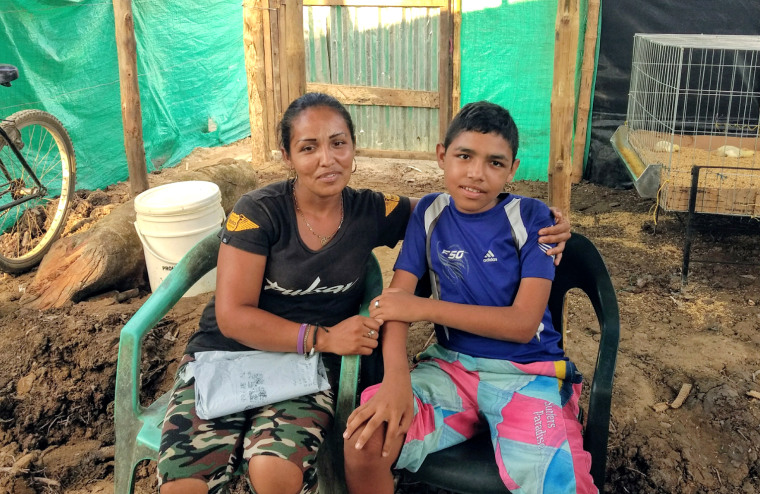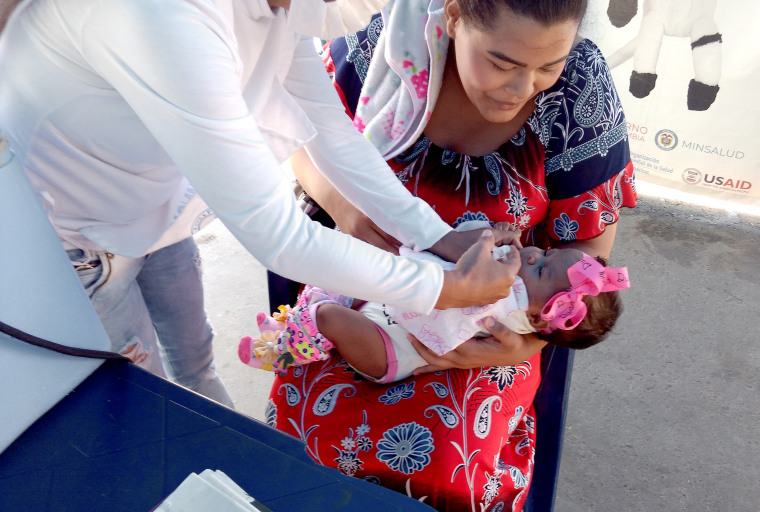ARAUCA, Colombia — Venezuelan Fiorelli Onda, 19, crossed the bridge last week that separates Colombia and Venezuela near the Colombian town of Arauca to vaccinate her 2-month-old infant daughter Duglannis Onda — because the Venezuelan health system can't provide even this most basic service.
Even though measles was eliminated in the Americas in 2016, travelers from areas where the virus still spreads can and do carry it across borders. Brazil and Venezuela are among 12 countries in the Americas with measles outbreaks, according to the World Health Organization. Brazil has had more than 10,000 cases and Venezuela has had more than 9,000. While two doses of measles vaccine provides 95 percent protection, the virus spreads rapidly in unvaccinated or undervaccinated populations.
"The health system in Venezuela collapsed and like we saw in Syria, that leads to an outbreak of transmissible diseases, not just vector-borne, but also measles and sexually transmitted diseases," said Dr. Alvaro Acosta Serrano, a Venezuelan researcher and senior lecturer at the UK's Liverpool School of Tropical Medicine. "In the case of Venezuela, there's mismanagement, corruption and the unwillingness of the government to act."
More chaos may be on the way to push Venezuelans to the border. On Wednesday, the leader of Venezuela’s legislature Juan Guaidó declared himself acting president of the country. Within hours, President Trump had recognized Guaidó as the legitimate president, not Nicolás Maduro, who just two weeks ago had been sworn in to his second six-year term — after an election widely criticised for its lack of transparency and fairness. It was later revealed that Vice-President Mike Pence had called Guaido on Tuesday evening and said President Trump would back him if he made his move against Maduro.
As turmoil and uncertainty continue in Venezuela, Colombian health authorities say the country has so far averted similar measles outbreaks through high vaccination rates, but they remain vigilant.
Yudi Gonzalez, an epidemiological expert at the Arauca government health unit says the Pan American Health Organization (PAHO), the regional branch of the World Health Organisation, supports a full-time team of four vaccinators in the city of Arauca. The city is located in the region of the same name and the vaccination effort there emcompasses a tent just yards away from the border with Venezuela.

In Arauca alone, 12,000 vaccinations were given in 2017 and more than 60,000 were given in 2018. The doses protected patients from a variety of diseases, ranging from yellow fever mainly for adults to measles and diphtheria for children.
Concerned Venezuelan father Ender Molina told NBC News his daughter Guadalupe Molina, now 10 months old, arrived in Colombia without any of her childhood immunizations.
"She had to get eight shots in just one day," he says.
The crisis in Venezuela has sent more than two million migrants into Colombia, putting a strain on the nation’s health care services.
According to the Arauca health unit's latest statistics, in 2017, only 139 Venezuelan patients came to Colombian emergency rooms in the region. In 2018, that jumped to 552, including a tripling of malaria cases from 27 in 2017 to 89 in 2018.
Origin of a crisis
Julio Castro, a professor at the Institute of Tropical Medicine at the Central University of Venezuela in Caracas, says after more than 30 years of successful vaccination efforts, there has been a strong downward curve in vaccination rates in Venezuela.
The latest PAHO report shows hepatitis B and diphtheria vaccination rates in Venezuela were both lower in 2017 than their peak in 2015.
Castro said the PAHO had worked hard to ensure that there were vaccines available in the warehouses of the Venezuelan Ministry of Health.
"But the only way for PAHO to continue to send the vaccines was to extend the Venezuelan government line of credit," he said.
But in his opinion, the ministry itself hasn't been fulfilling its obligation to provide the logistics or organization to carry out regular, consistent vaccination programs.
Acosta Serrano, who has family living in Colombia, says that hunger and stress -- often experienced by Venezuelans who walk through the Andes mountains to get to Colombia -- make people more vulnerable to disease in the first place. The lack of vaccinations also makes the spread of disease more likely, he added.
Border region faces more than one crisis
Vaccination is just one of the many incipient health crises along the border.
Health officials in Arauca and another border region, La Guajira both told NBC News that Colombian hospitals are in a funding crisis because they are obligated to provide emergency care, but the Colombian government emergency fund is empty.

"The emergency health fund does not have funds at the national level so there is no money for the emergencies of the departments where the migratory crisis is higher," said Gonzalez.
Gonzalez added that without documents, Venezuelans can only receive emergency care from Colombian clinics, meaning many Venezuelans with chronic conditions are on their own.
A stark illustration of this comes during a sunny afternoon on Colombian side of the border, as Katerina Vinegas, with her son Jeferson Miranda, 14, wait for Jeferson's sisters to come back from playing at a nearby activity tent run by Save The Children, an international charity.
Vinegas told NBC News that she had been working non-stop selling coffee to provide for her son, who has Duchenne muscular dystrophy that prevents him from walking unassisted.
"Jeferson has not been able to have therapy or see a neurologist since he arrived because he does not have documents," she said.
Back at the bridge, the line of mothers waiting to have their children vaccinated stretches out behind Onda and her baby. The line nearly reaches the border and into Venezuela, the origin of the crisis.

